Consumer Demand and Buying Habits in Developing Economies: Nigeria
VerifiedAdded on 2021/02/19
|13
|2094
|147
Report
AI Summary
This report investigates the relevance of consumer demand theory in understanding the buying habits of consumers within the developing economy of Nigeria. It begins with an introduction to microeconomics and consumer demand theory, emphasizing the role of consumer preferences and utility maximization. The report outlines the aim, objectives, and research questions guiding the study, followed by a comprehensive literature review that examines existing research on consumer behavior, urbanization, income, and marketing influences. The methodology section details the research methods, philosophy, approach, design, data collection techniques (primary and secondary research), and sampling methods (random sampling of 20 Nigerian consumers). The report uses a qualitative approach with thematic analysis to assess buying habits. The study aims to identify microeconomic challenges faced by organizations in Nigeria when deriving consumer demand and recommends ways to improve understanding of consumer behavior. It concludes by summarizing the findings and their implications for businesses and policymakers in Nigeria, along with a time plan for the research and a list of references.
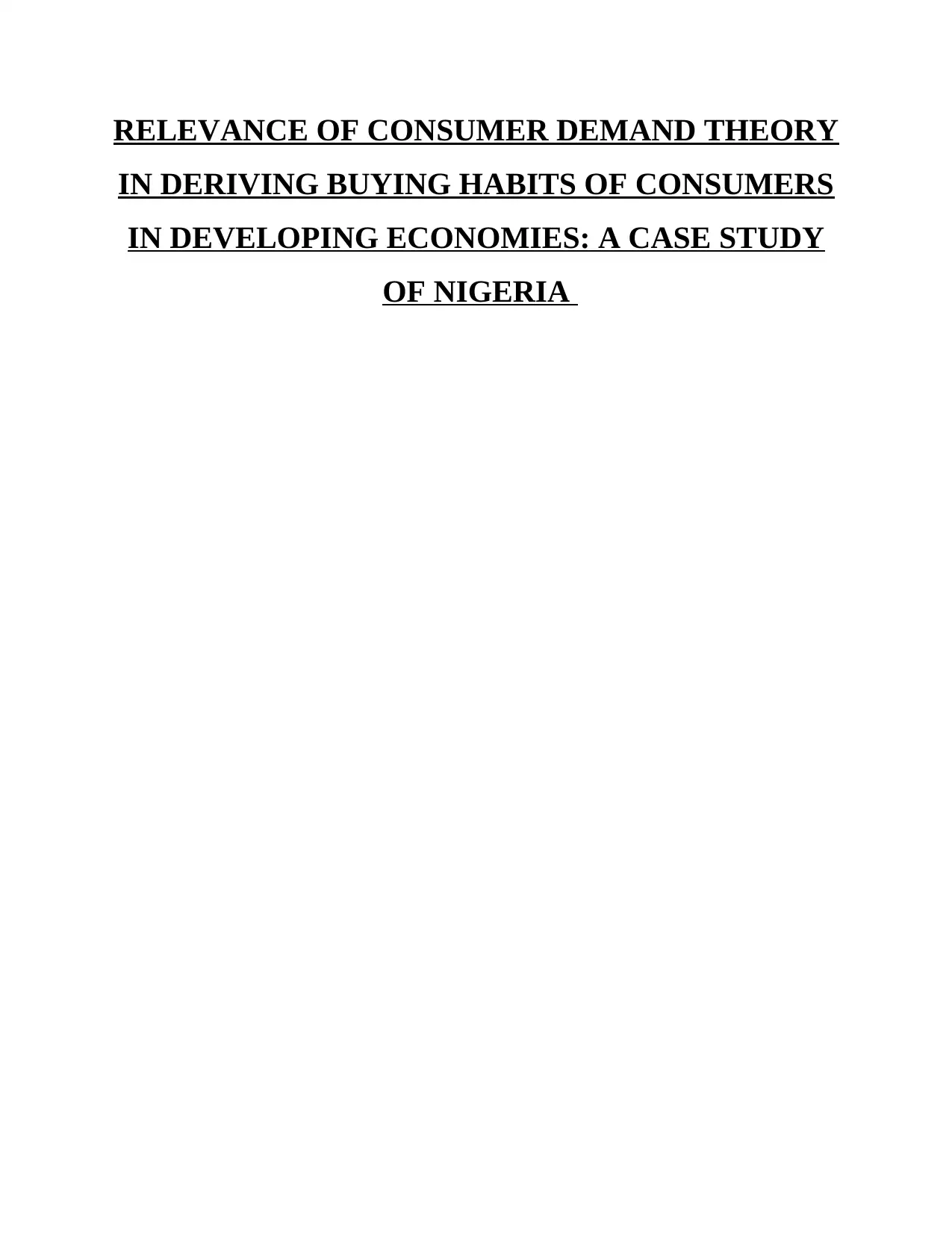
RELEVANCE OF CONSUMER DEMAND THEORY
IN DERIVING BUYING HABITS OF CONSUMERS
IN DEVELOPING ECONOMIES: A CASE STUDY
OF NIGERIA
IN DERIVING BUYING HABITS OF CONSUMERS
IN DEVELOPING ECONOMIES: A CASE STUDY
OF NIGERIA
Paraphrase This Document
Need a fresh take? Get an instant paraphrase of this document with our AI Paraphraser
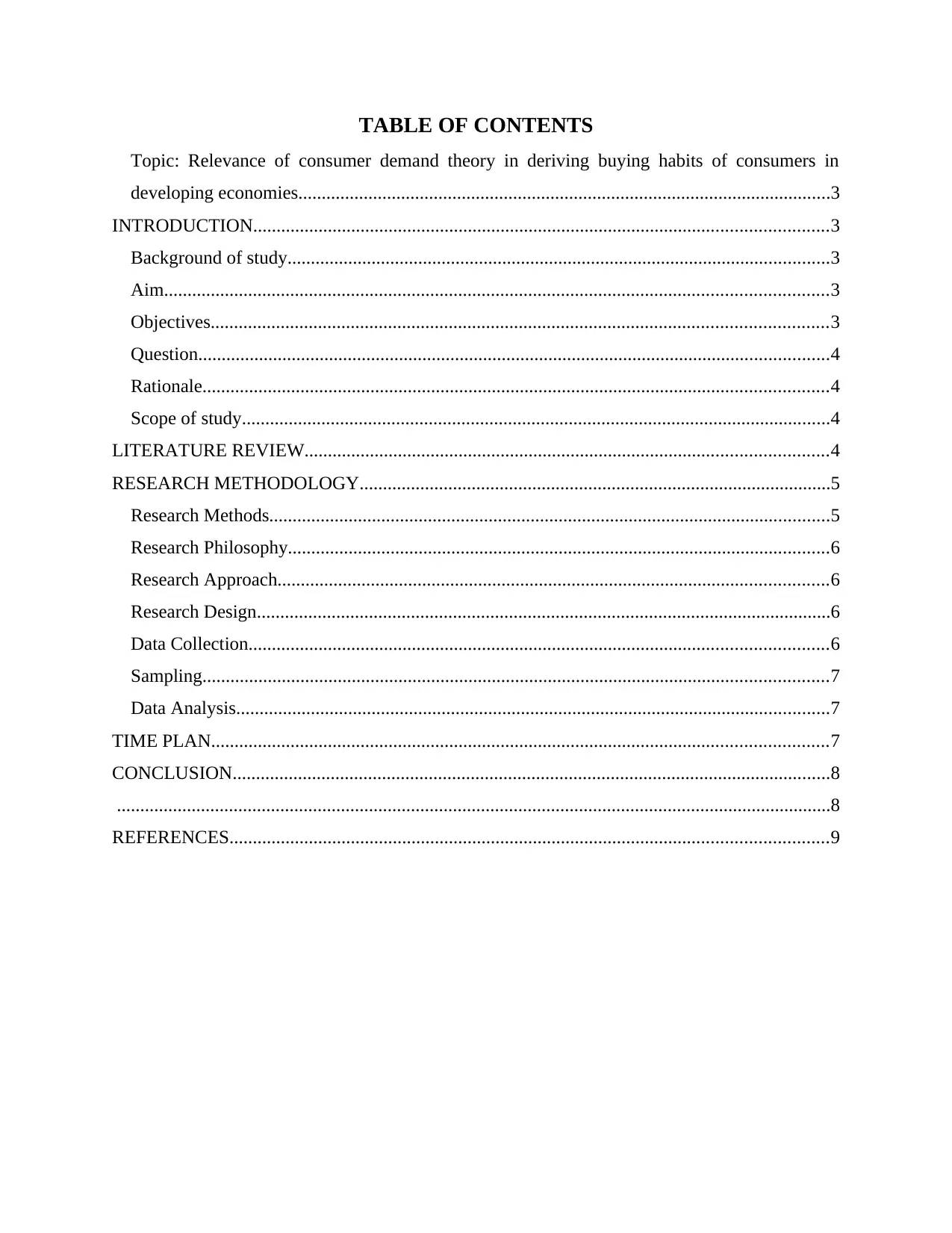
TABLE OF CONTENTS
Topic: Relevance of consumer demand theory in deriving buying habits of consumers in
developing economies..................................................................................................................3
INTRODUCTION...........................................................................................................................3
Background of study....................................................................................................................3
Aim..............................................................................................................................................3
Objectives....................................................................................................................................3
Question.......................................................................................................................................4
Rationale......................................................................................................................................4
Scope of study..............................................................................................................................4
LITERATURE REVIEW................................................................................................................4
RESEARCH METHODOLOGY.....................................................................................................5
Research Methods........................................................................................................................5
Research Philosophy....................................................................................................................6
Research Approach......................................................................................................................6
Research Design...........................................................................................................................6
Data Collection............................................................................................................................6
Sampling......................................................................................................................................7
Data Analysis...............................................................................................................................7
TIME PLAN....................................................................................................................................7
CONCLUSION................................................................................................................................8
.........................................................................................................................................................8
REFERENCES................................................................................................................................9
Topic: Relevance of consumer demand theory in deriving buying habits of consumers in
developing economies..................................................................................................................3
INTRODUCTION...........................................................................................................................3
Background of study....................................................................................................................3
Aim..............................................................................................................................................3
Objectives....................................................................................................................................3
Question.......................................................................................................................................4
Rationale......................................................................................................................................4
Scope of study..............................................................................................................................4
LITERATURE REVIEW................................................................................................................4
RESEARCH METHODOLOGY.....................................................................................................5
Research Methods........................................................................................................................5
Research Philosophy....................................................................................................................6
Research Approach......................................................................................................................6
Research Design...........................................................................................................................6
Data Collection............................................................................................................................6
Sampling......................................................................................................................................7
Data Analysis...............................................................................................................................7
TIME PLAN....................................................................................................................................7
CONCLUSION................................................................................................................................8
.........................................................................................................................................................8
REFERENCES................................................................................................................................9
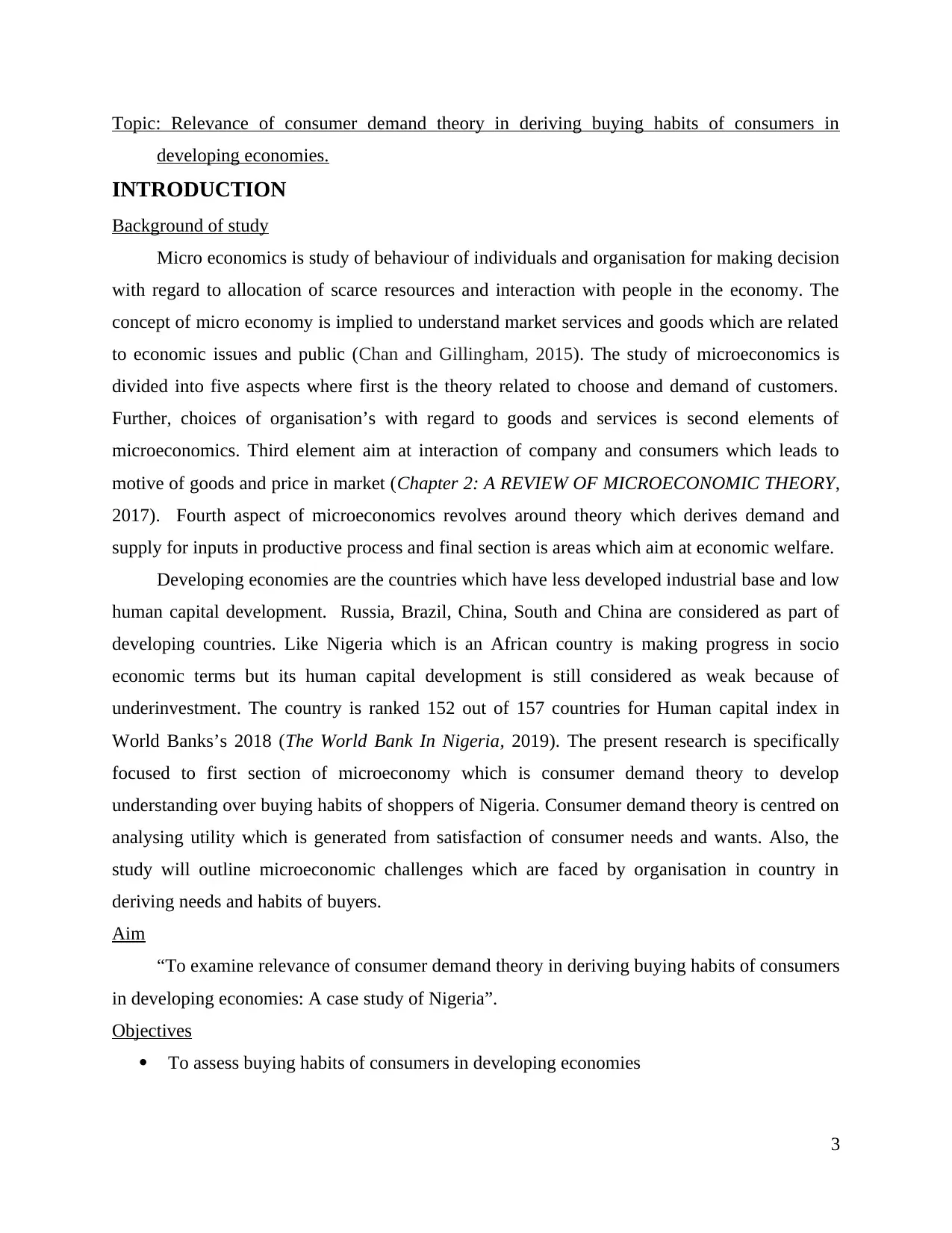
Topic: Relevance of consumer demand theory in deriving buying habits of consumers in
developing economies.
INTRODUCTION
Background of study
Micro economics is study of behaviour of individuals and organisation for making decision
with regard to allocation of scarce resources and interaction with people in the economy. The
concept of micro economy is implied to understand market services and goods which are related
to economic issues and public (Chan and Gillingham, 2015). The study of microeconomics is
divided into five aspects where first is the theory related to choose and demand of customers.
Further, choices of organisation’s with regard to goods and services is second elements of
microeconomics. Third element aim at interaction of company and consumers which leads to
motive of goods and price in market (Chapter 2: A REVIEW OF MICROECONOMIC THEORY,
2017). Fourth aspect of microeconomics revolves around theory which derives demand and
supply for inputs in productive process and final section is areas which aim at economic welfare.
Developing economies are the countries which have less developed industrial base and low
human capital development. Russia, Brazil, China, South and China are considered as part of
developing countries. Like Nigeria which is an African country is making progress in socio
economic terms but its human capital development is still considered as weak because of
underinvestment. The country is ranked 152 out of 157 countries for Human capital index in
World Banks’s 2018 (The World Bank In Nigeria, 2019). The present research is specifically
focused to first section of microeconomy which is consumer demand theory to develop
understanding over buying habits of shoppers of Nigeria. Consumer demand theory is centred on
analysing utility which is generated from satisfaction of consumer needs and wants. Also, the
study will outline microeconomic challenges which are faced by organisation in country in
deriving needs and habits of buyers.
Aim
“To examine relevance of consumer demand theory in deriving buying habits of consumers
in developing economies: A case study of Nigeria”.
Objectives
To assess buying habits of consumers in developing economies
3
developing economies.
INTRODUCTION
Background of study
Micro economics is study of behaviour of individuals and organisation for making decision
with regard to allocation of scarce resources and interaction with people in the economy. The
concept of micro economy is implied to understand market services and goods which are related
to economic issues and public (Chan and Gillingham, 2015). The study of microeconomics is
divided into five aspects where first is the theory related to choose and demand of customers.
Further, choices of organisation’s with regard to goods and services is second elements of
microeconomics. Third element aim at interaction of company and consumers which leads to
motive of goods and price in market (Chapter 2: A REVIEW OF MICROECONOMIC THEORY,
2017). Fourth aspect of microeconomics revolves around theory which derives demand and
supply for inputs in productive process and final section is areas which aim at economic welfare.
Developing economies are the countries which have less developed industrial base and low
human capital development. Russia, Brazil, China, South and China are considered as part of
developing countries. Like Nigeria which is an African country is making progress in socio
economic terms but its human capital development is still considered as weak because of
underinvestment. The country is ranked 152 out of 157 countries for Human capital index in
World Banks’s 2018 (The World Bank In Nigeria, 2019). The present research is specifically
focused to first section of microeconomy which is consumer demand theory to develop
understanding over buying habits of shoppers of Nigeria. Consumer demand theory is centred on
analysing utility which is generated from satisfaction of consumer needs and wants. Also, the
study will outline microeconomic challenges which are faced by organisation in country in
deriving needs and habits of buyers.
Aim
“To examine relevance of consumer demand theory in deriving buying habits of consumers
in developing economies: A case study of Nigeria”.
Objectives
To assess buying habits of consumers in developing economies
3
⊘ This is a preview!⊘
Do you want full access?
Subscribe today to unlock all pages.

Trusted by 1+ million students worldwide
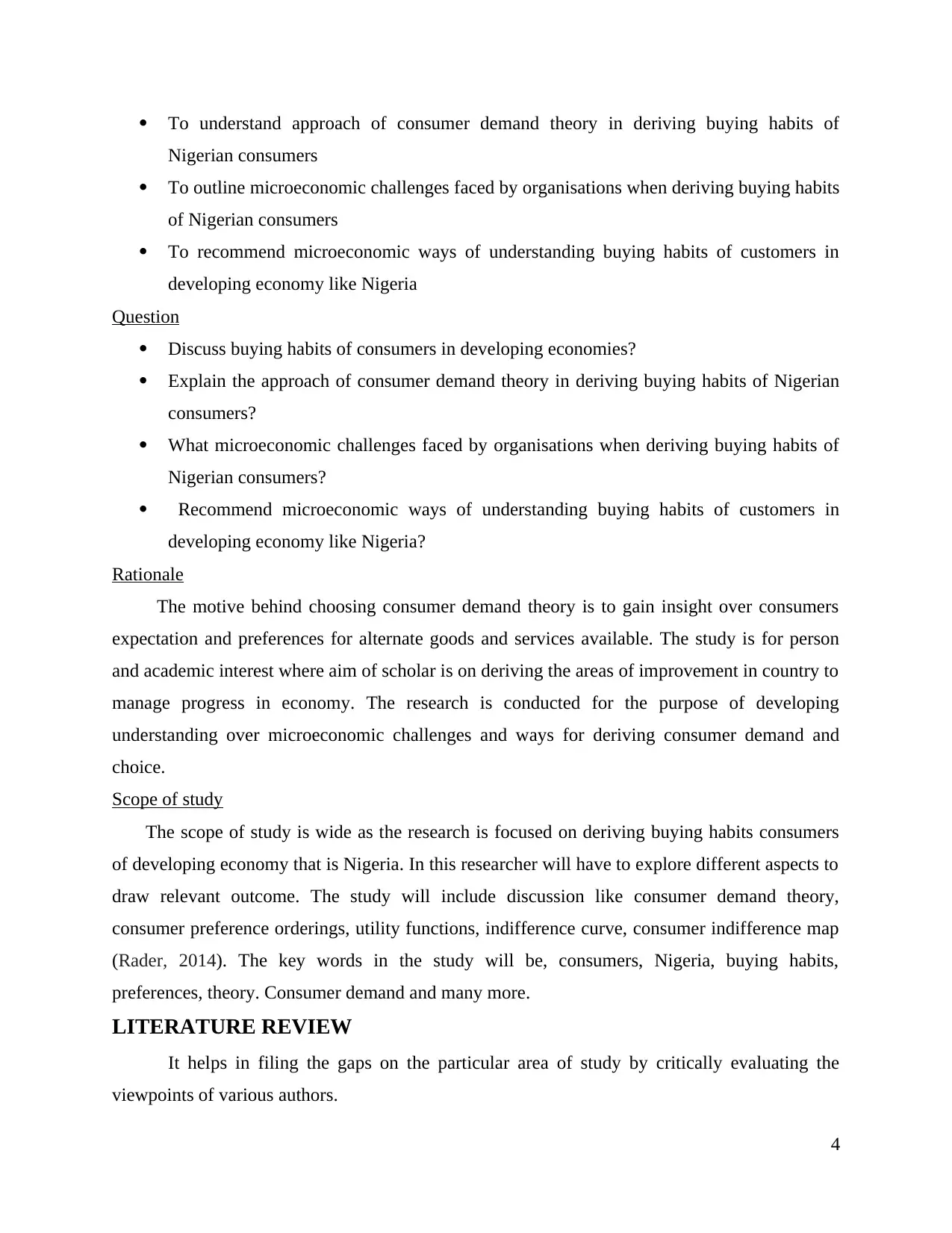
To understand approach of consumer demand theory in deriving buying habits of
Nigerian consumers
To outline microeconomic challenges faced by organisations when deriving buying habits
of Nigerian consumers
To recommend microeconomic ways of understanding buying habits of customers in
developing economy like Nigeria
Question
Discuss buying habits of consumers in developing economies?
Explain the approach of consumer demand theory in deriving buying habits of Nigerian
consumers?
What microeconomic challenges faced by organisations when deriving buying habits of
Nigerian consumers?
Recommend microeconomic ways of understanding buying habits of customers in
developing economy like Nigeria?
Rationale
The motive behind choosing consumer demand theory is to gain insight over consumers
expectation and preferences for alternate goods and services available. The study is for person
and academic interest where aim of scholar is on deriving the areas of improvement in country to
manage progress in economy. The research is conducted for the purpose of developing
understanding over microeconomic challenges and ways for deriving consumer demand and
choice.
Scope of study
The scope of study is wide as the research is focused on deriving buying habits consumers
of developing economy that is Nigeria. In this researcher will have to explore different aspects to
draw relevant outcome. The study will include discussion like consumer demand theory,
consumer preference orderings, utility functions, indifference curve, consumer indifference map
(Rader, 2014). The key words in the study will be, consumers, Nigeria, buying habits,
preferences, theory. Consumer demand and many more.
LITERATURE REVIEW
It helps in filing the gaps on the particular area of study by critically evaluating the
viewpoints of various authors.
4
Nigerian consumers
To outline microeconomic challenges faced by organisations when deriving buying habits
of Nigerian consumers
To recommend microeconomic ways of understanding buying habits of customers in
developing economy like Nigeria
Question
Discuss buying habits of consumers in developing economies?
Explain the approach of consumer demand theory in deriving buying habits of Nigerian
consumers?
What microeconomic challenges faced by organisations when deriving buying habits of
Nigerian consumers?
Recommend microeconomic ways of understanding buying habits of customers in
developing economy like Nigeria?
Rationale
The motive behind choosing consumer demand theory is to gain insight over consumers
expectation and preferences for alternate goods and services available. The study is for person
and academic interest where aim of scholar is on deriving the areas of improvement in country to
manage progress in economy. The research is conducted for the purpose of developing
understanding over microeconomic challenges and ways for deriving consumer demand and
choice.
Scope of study
The scope of study is wide as the research is focused on deriving buying habits consumers
of developing economy that is Nigeria. In this researcher will have to explore different aspects to
draw relevant outcome. The study will include discussion like consumer demand theory,
consumer preference orderings, utility functions, indifference curve, consumer indifference map
(Rader, 2014). The key words in the study will be, consumers, Nigeria, buying habits,
preferences, theory. Consumer demand and many more.
LITERATURE REVIEW
It helps in filing the gaps on the particular area of study by critically evaluating the
viewpoints of various authors.
4
Paraphrase This Document
Need a fresh take? Get an instant paraphrase of this document with our AI Paraphraser
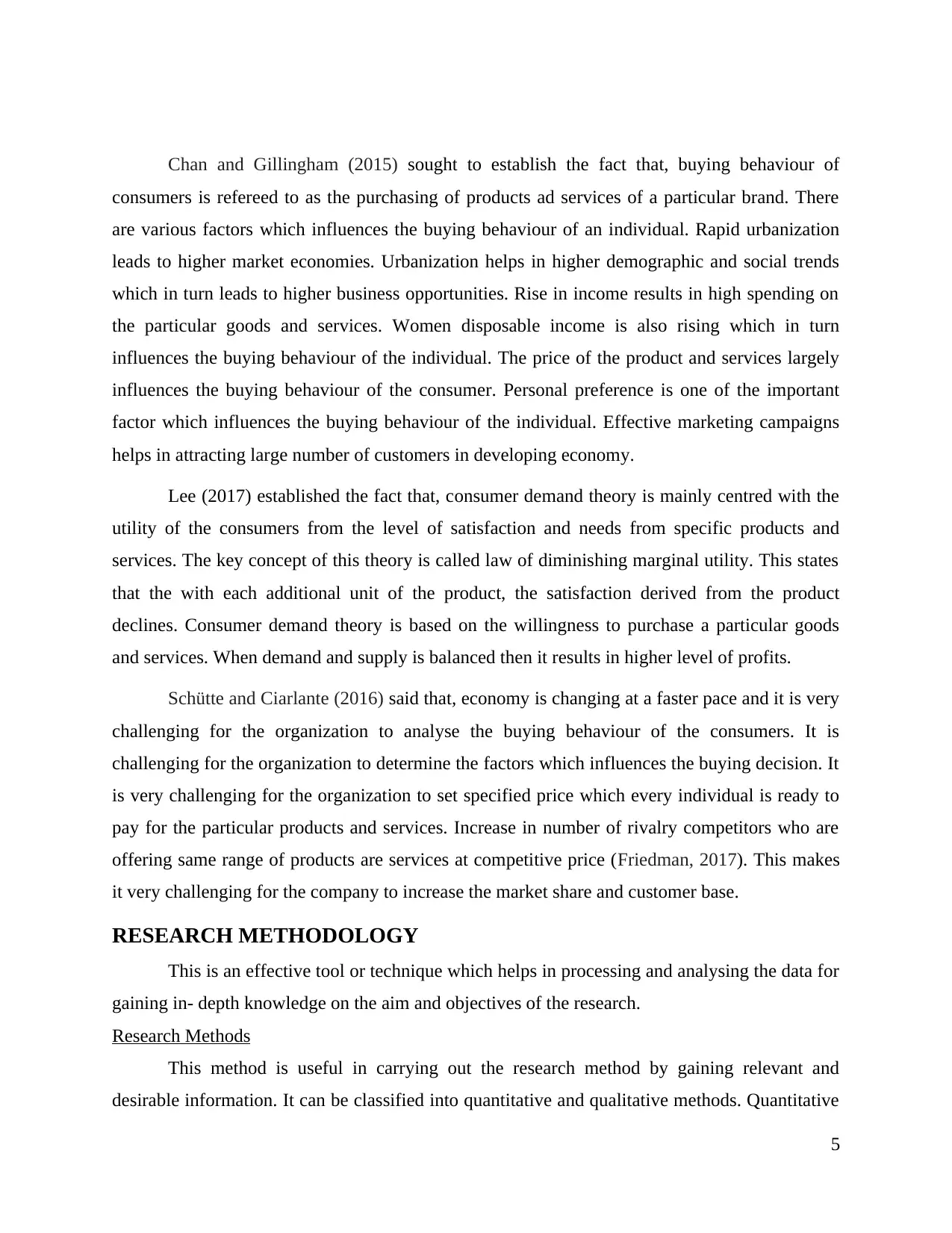
Chan and Gillingham (2015) sought to establish the fact that, buying behaviour of
consumers is refereed to as the purchasing of products ad services of a particular brand. There
are various factors which influences the buying behaviour of an individual. Rapid urbanization
leads to higher market economies. Urbanization helps in higher demographic and social trends
which in turn leads to higher business opportunities. Rise in income results in high spending on
the particular goods and services. Women disposable income is also rising which in turn
influences the buying behaviour of the individual. The price of the product and services largely
influences the buying behaviour of the consumer. Personal preference is one of the important
factor which influences the buying behaviour of the individual. Effective marketing campaigns
helps in attracting large number of customers in developing economy.
Lee (2017) established the fact that, consumer demand theory is mainly centred with the
utility of the consumers from the level of satisfaction and needs from specific products and
services. The key concept of this theory is called law of diminishing marginal utility. This states
that the with each additional unit of the product, the satisfaction derived from the product
declines. Consumer demand theory is based on the willingness to purchase a particular goods
and services. When demand and supply is balanced then it results in higher level of profits.
Schütte and Ciarlante (2016) said that, economy is changing at a faster pace and it is very
challenging for the organization to analyse the buying behaviour of the consumers. It is
challenging for the organization to determine the factors which influences the buying decision. It
is very challenging for the organization to set specified price which every individual is ready to
pay for the particular products and services. Increase in number of rivalry competitors who are
offering same range of products are services at competitive price (Friedman, 2017). This makes
it very challenging for the company to increase the market share and customer base.
RESEARCH METHODOLOGY
This is an effective tool or technique which helps in processing and analysing the data for
gaining in- depth knowledge on the aim and objectives of the research.
Research Methods
This method is useful in carrying out the research method by gaining relevant and
desirable information. It can be classified into quantitative and qualitative methods. Quantitative
5
consumers is refereed to as the purchasing of products ad services of a particular brand. There
are various factors which influences the buying behaviour of an individual. Rapid urbanization
leads to higher market economies. Urbanization helps in higher demographic and social trends
which in turn leads to higher business opportunities. Rise in income results in high spending on
the particular goods and services. Women disposable income is also rising which in turn
influences the buying behaviour of the individual. The price of the product and services largely
influences the buying behaviour of the consumer. Personal preference is one of the important
factor which influences the buying behaviour of the individual. Effective marketing campaigns
helps in attracting large number of customers in developing economy.
Lee (2017) established the fact that, consumer demand theory is mainly centred with the
utility of the consumers from the level of satisfaction and needs from specific products and
services. The key concept of this theory is called law of diminishing marginal utility. This states
that the with each additional unit of the product, the satisfaction derived from the product
declines. Consumer demand theory is based on the willingness to purchase a particular goods
and services. When demand and supply is balanced then it results in higher level of profits.
Schütte and Ciarlante (2016) said that, economy is changing at a faster pace and it is very
challenging for the organization to analyse the buying behaviour of the consumers. It is
challenging for the organization to determine the factors which influences the buying decision. It
is very challenging for the organization to set specified price which every individual is ready to
pay for the particular products and services. Increase in number of rivalry competitors who are
offering same range of products are services at competitive price (Friedman, 2017). This makes
it very challenging for the company to increase the market share and customer base.
RESEARCH METHODOLOGY
This is an effective tool or technique which helps in processing and analysing the data for
gaining in- depth knowledge on the aim and objectives of the research.
Research Methods
This method is useful in carrying out the research method by gaining relevant and
desirable information. It can be classified into quantitative and qualitative methods. Quantitative
5
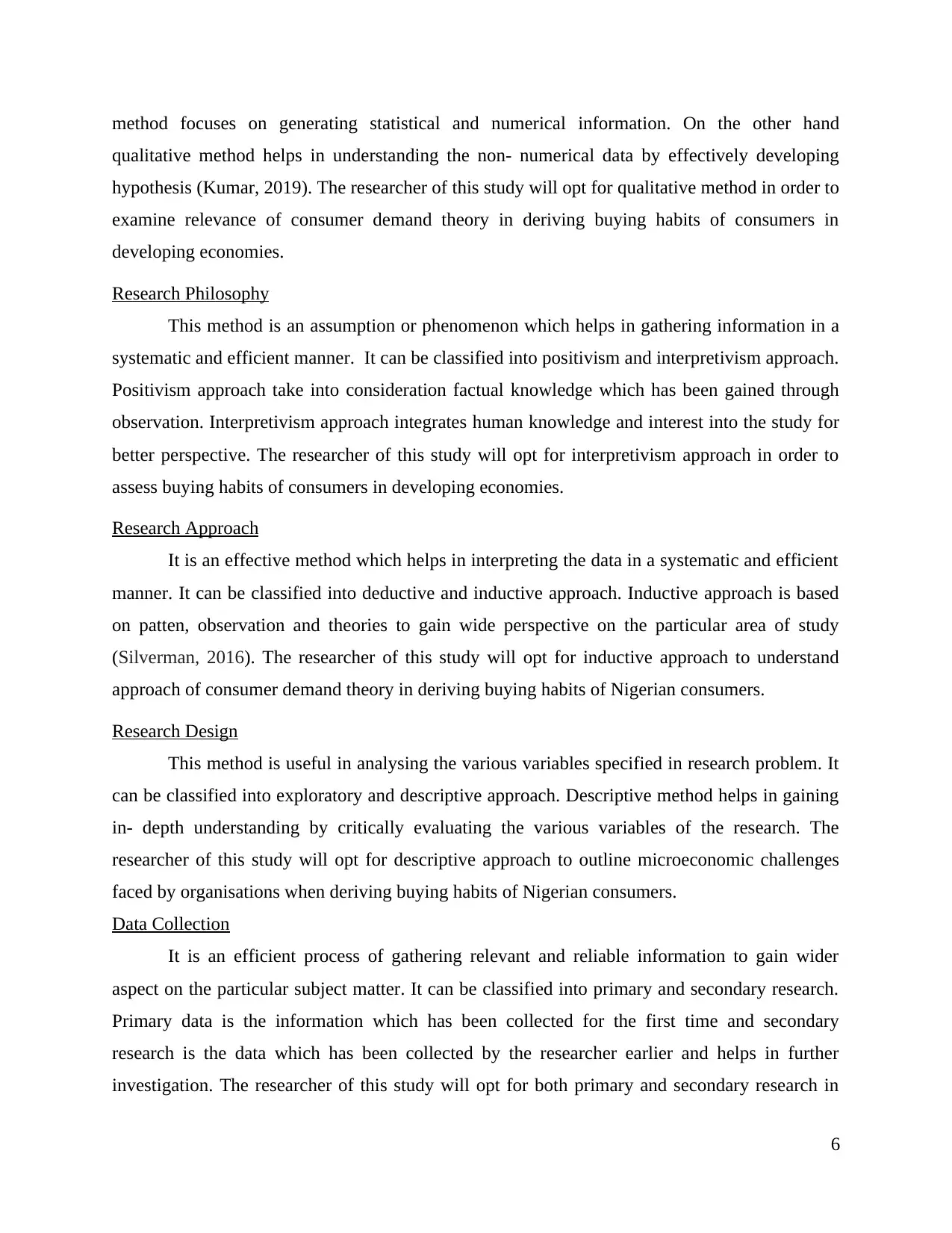
method focuses on generating statistical and numerical information. On the other hand
qualitative method helps in understanding the non- numerical data by effectively developing
hypothesis (Kumar, 2019). The researcher of this study will opt for qualitative method in order to
examine relevance of consumer demand theory in deriving buying habits of consumers in
developing economies.
Research Philosophy
This method is an assumption or phenomenon which helps in gathering information in a
systematic and efficient manner. It can be classified into positivism and interpretivism approach.
Positivism approach take into consideration factual knowledge which has been gained through
observation. Interpretivism approach integrates human knowledge and interest into the study for
better perspective. The researcher of this study will opt for interpretivism approach in order to
assess buying habits of consumers in developing economies.
Research Approach
It is an effective method which helps in interpreting the data in a systematic and efficient
manner. It can be classified into deductive and inductive approach. Inductive approach is based
on patten, observation and theories to gain wide perspective on the particular area of study
(Silverman, 2016). The researcher of this study will opt for inductive approach to understand
approach of consumer demand theory in deriving buying habits of Nigerian consumers.
Research Design
This method is useful in analysing the various variables specified in research problem. It
can be classified into exploratory and descriptive approach. Descriptive method helps in gaining
in- depth understanding by critically evaluating the various variables of the research. The
researcher of this study will opt for descriptive approach to outline microeconomic challenges
faced by organisations when deriving buying habits of Nigerian consumers.
Data Collection
It is an efficient process of gathering relevant and reliable information to gain wider
aspect on the particular subject matter. It can be classified into primary and secondary research.
Primary data is the information which has been collected for the first time and secondary
research is the data which has been collected by the researcher earlier and helps in further
investigation. The researcher of this study will opt for both primary and secondary research in
6
qualitative method helps in understanding the non- numerical data by effectively developing
hypothesis (Kumar, 2019). The researcher of this study will opt for qualitative method in order to
examine relevance of consumer demand theory in deriving buying habits of consumers in
developing economies.
Research Philosophy
This method is an assumption or phenomenon which helps in gathering information in a
systematic and efficient manner. It can be classified into positivism and interpretivism approach.
Positivism approach take into consideration factual knowledge which has been gained through
observation. Interpretivism approach integrates human knowledge and interest into the study for
better perspective. The researcher of this study will opt for interpretivism approach in order to
assess buying habits of consumers in developing economies.
Research Approach
It is an effective method which helps in interpreting the data in a systematic and efficient
manner. It can be classified into deductive and inductive approach. Inductive approach is based
on patten, observation and theories to gain wide perspective on the particular area of study
(Silverman, 2016). The researcher of this study will opt for inductive approach to understand
approach of consumer demand theory in deriving buying habits of Nigerian consumers.
Research Design
This method is useful in analysing the various variables specified in research problem. It
can be classified into exploratory and descriptive approach. Descriptive method helps in gaining
in- depth understanding by critically evaluating the various variables of the research. The
researcher of this study will opt for descriptive approach to outline microeconomic challenges
faced by organisations when deriving buying habits of Nigerian consumers.
Data Collection
It is an efficient process of gathering relevant and reliable information to gain wider
aspect on the particular subject matter. It can be classified into primary and secondary research.
Primary data is the information which has been collected for the first time and secondary
research is the data which has been collected by the researcher earlier and helps in further
investigation. The researcher of this study will opt for both primary and secondary research in
6
⊘ This is a preview!⊘
Do you want full access?
Subscribe today to unlock all pages.

Trusted by 1+ million students worldwide
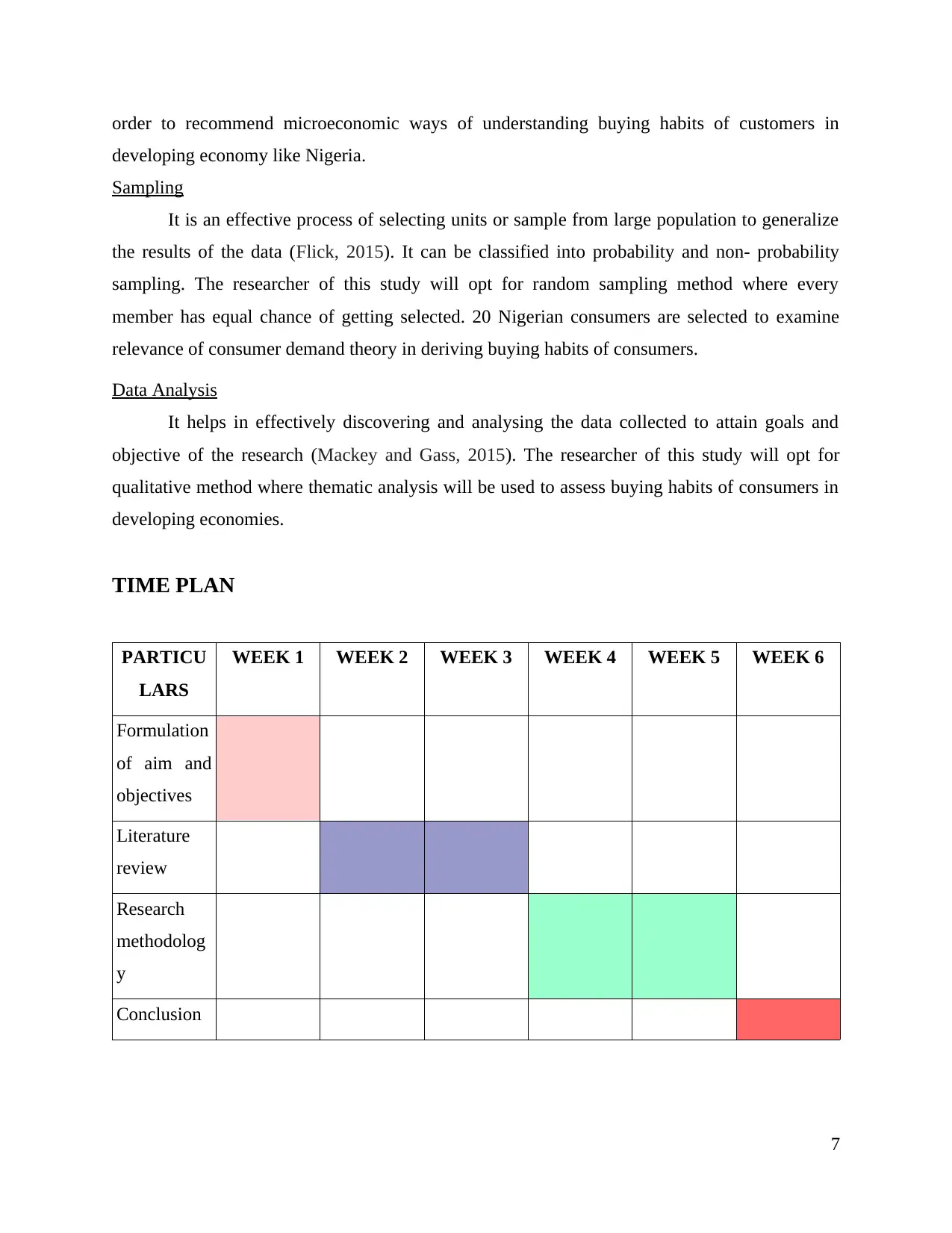
order to recommend microeconomic ways of understanding buying habits of customers in
developing economy like Nigeria.
Sampling
It is an effective process of selecting units or sample from large population to generalize
the results of the data (Flick, 2015). It can be classified into probability and non- probability
sampling. The researcher of this study will opt for random sampling method where every
member has equal chance of getting selected. 20 Nigerian consumers are selected to examine
relevance of consumer demand theory in deriving buying habits of consumers.
Data Analysis
It helps in effectively discovering and analysing the data collected to attain goals and
objective of the research (Mackey and Gass, 2015). The researcher of this study will opt for
qualitative method where thematic analysis will be used to assess buying habits of consumers in
developing economies.
TIME PLAN
PARTICU
LARS
WEEK 1 WEEK 2 WEEK 3 WEEK 4 WEEK 5 WEEK 6
Formulation
of aim and
objectives
Literature
review
Research
methodolog
y
Conclusion
7
developing economy like Nigeria.
Sampling
It is an effective process of selecting units or sample from large population to generalize
the results of the data (Flick, 2015). It can be classified into probability and non- probability
sampling. The researcher of this study will opt for random sampling method where every
member has equal chance of getting selected. 20 Nigerian consumers are selected to examine
relevance of consumer demand theory in deriving buying habits of consumers.
Data Analysis
It helps in effectively discovering and analysing the data collected to attain goals and
objective of the research (Mackey and Gass, 2015). The researcher of this study will opt for
qualitative method where thematic analysis will be used to assess buying habits of consumers in
developing economies.
TIME PLAN
PARTICU
LARS
WEEK 1 WEEK 2 WEEK 3 WEEK 4 WEEK 5 WEEK 6
Formulation
of aim and
objectives
Literature
review
Research
methodolog
y
Conclusion
7
Paraphrase This Document
Need a fresh take? Get an instant paraphrase of this document with our AI Paraphraser
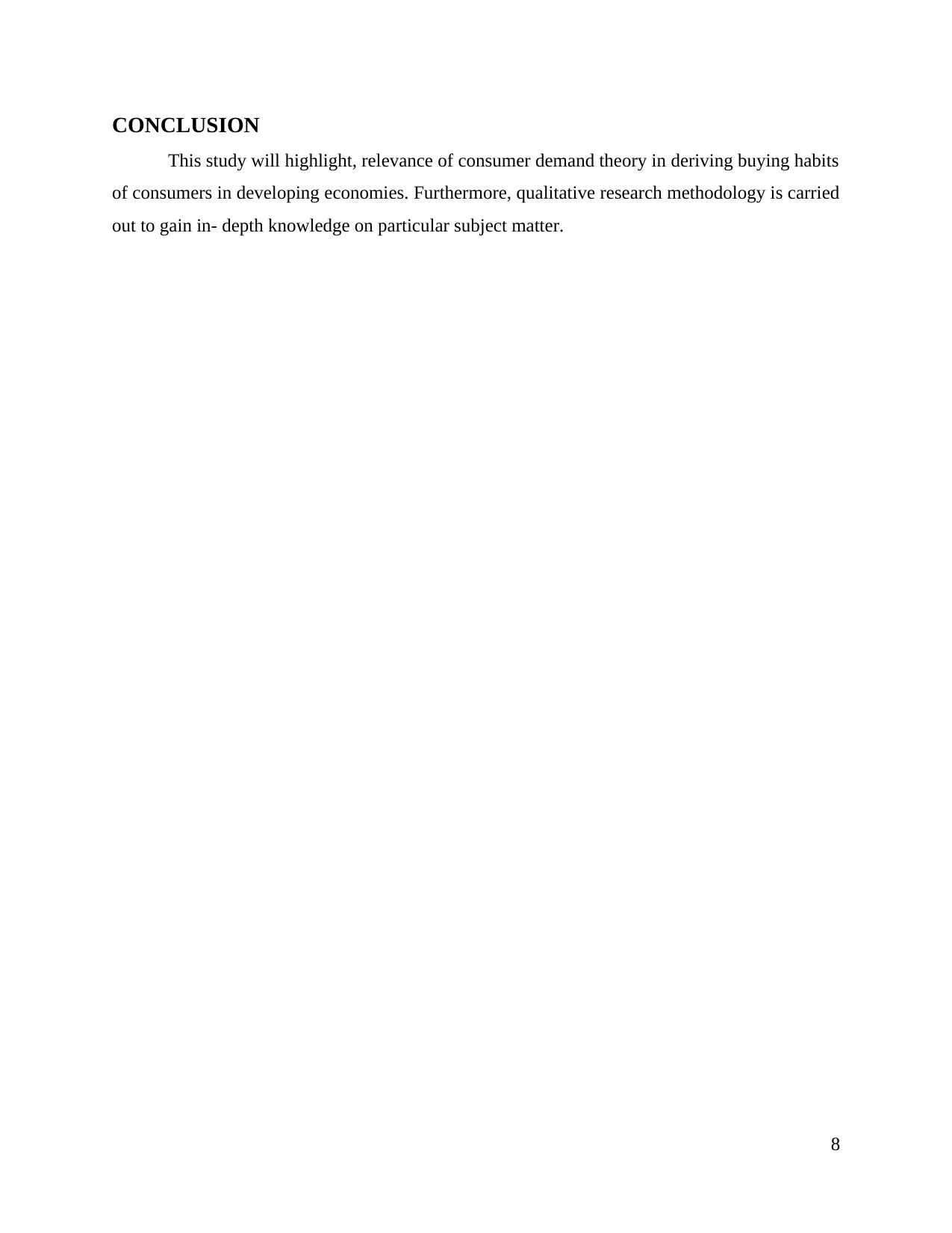
CONCLUSION
This study will highlight, relevance of consumer demand theory in deriving buying habits
of consumers in developing economies. Furthermore, qualitative research methodology is carried
out to gain in- depth knowledge on particular subject matter.
8
This study will highlight, relevance of consumer demand theory in deriving buying habits
of consumers in developing economies. Furthermore, qualitative research methodology is carried
out to gain in- depth knowledge on particular subject matter.
8
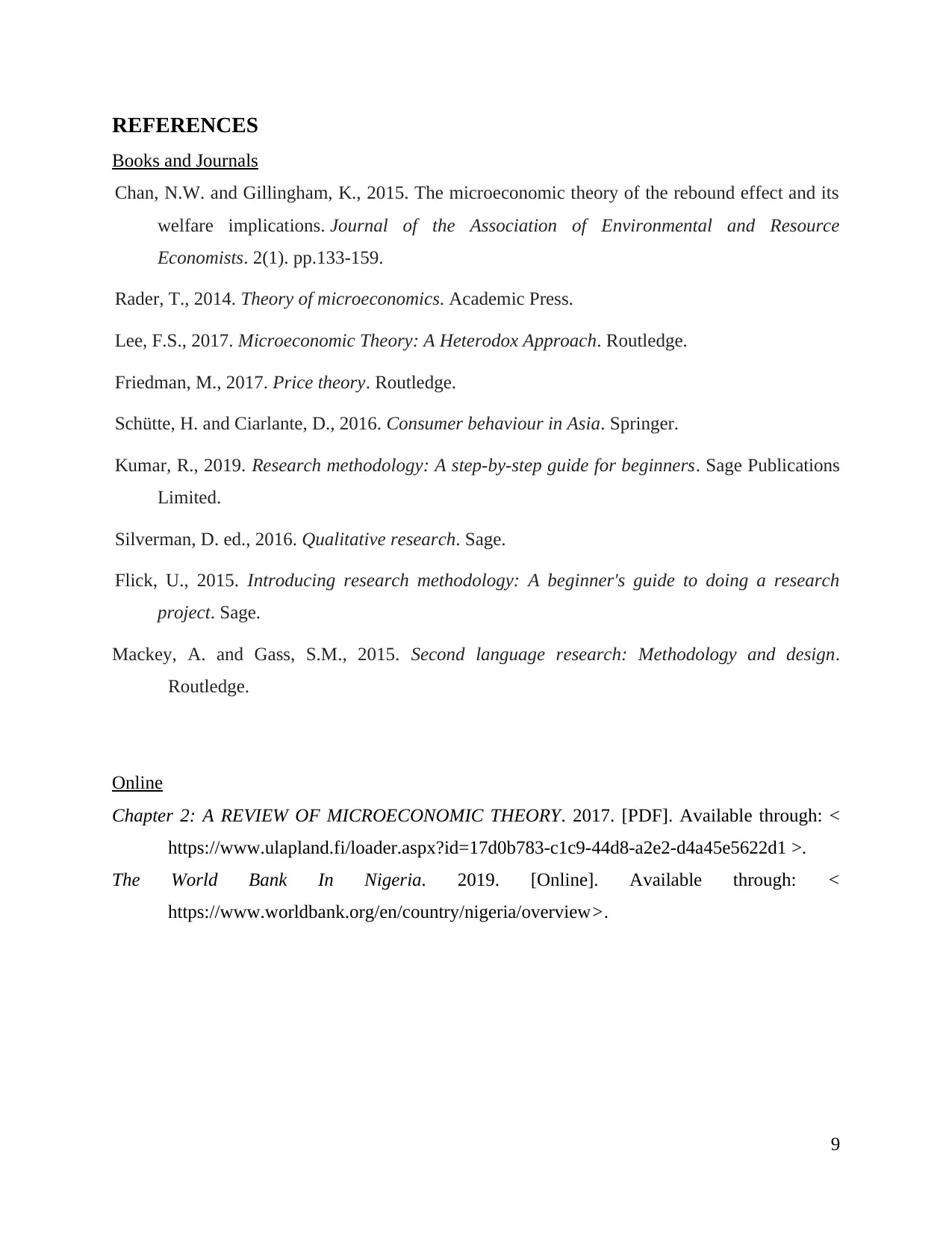
REFERENCES
Books and Journals
Chan, N.W. and Gillingham, K., 2015. The microeconomic theory of the rebound effect and its
welfare implications. Journal of the Association of Environmental and Resource
Economists. 2(1). pp.133-159.
Rader, T., 2014. Theory of microeconomics. Academic Press.
Lee, F.S., 2017. Microeconomic Theory: A Heterodox Approach. Routledge.
Friedman, M., 2017. Price theory. Routledge.
Schütte, H. and Ciarlante, D., 2016. Consumer behaviour in Asia. Springer.
Kumar, R., 2019. Research methodology: A step-by-step guide for beginners. Sage Publications
Limited.
Silverman, D. ed., 2016. Qualitative research. Sage.
Flick, U., 2015. Introducing research methodology: A beginner's guide to doing a research
project. Sage.
Mackey, A. and Gass, S.M., 2015. Second language research: Methodology and design.
Routledge.
Online
Chapter 2: A REVIEW OF MICROECONOMIC THEORY. 2017. [PDF]. Available through: <
https://www.ulapland.fi/loader.aspx?id=17d0b783-c1c9-44d8-a2e2-d4a45e5622d1 >.
The World Bank In Nigeria. 2019. [Online]. Available through: <
https://www.worldbank.org/en/country/nigeria/overview>.
9
Books and Journals
Chan, N.W. and Gillingham, K., 2015. The microeconomic theory of the rebound effect and its
welfare implications. Journal of the Association of Environmental and Resource
Economists. 2(1). pp.133-159.
Rader, T., 2014. Theory of microeconomics. Academic Press.
Lee, F.S., 2017. Microeconomic Theory: A Heterodox Approach. Routledge.
Friedman, M., 2017. Price theory. Routledge.
Schütte, H. and Ciarlante, D., 2016. Consumer behaviour in Asia. Springer.
Kumar, R., 2019. Research methodology: A step-by-step guide for beginners. Sage Publications
Limited.
Silverman, D. ed., 2016. Qualitative research. Sage.
Flick, U., 2015. Introducing research methodology: A beginner's guide to doing a research
project. Sage.
Mackey, A. and Gass, S.M., 2015. Second language research: Methodology and design.
Routledge.
Online
Chapter 2: A REVIEW OF MICROECONOMIC THEORY. 2017. [PDF]. Available through: <
https://www.ulapland.fi/loader.aspx?id=17d0b783-c1c9-44d8-a2e2-d4a45e5622d1 >.
The World Bank In Nigeria. 2019. [Online]. Available through: <
https://www.worldbank.org/en/country/nigeria/overview>.
9
⊘ This is a preview!⊘
Do you want full access?
Subscribe today to unlock all pages.

Trusted by 1+ million students worldwide

10
Paraphrase This Document
Need a fresh take? Get an instant paraphrase of this document with our AI Paraphraser

11

12
⊘ This is a preview!⊘
Do you want full access?
Subscribe today to unlock all pages.

Trusted by 1+ million students worldwide
1 out of 13
Related Documents
Your All-in-One AI-Powered Toolkit for Academic Success.
+13062052269
info@desklib.com
Available 24*7 on WhatsApp / Email
![[object Object]](/_next/static/media/star-bottom.7253800d.svg)
Unlock your academic potential
Copyright © 2020–2025 A2Z Services. All Rights Reserved. Developed and managed by ZUCOL.




